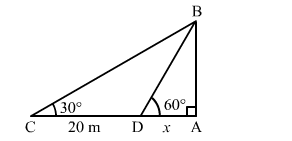On the level ground, the angle of elevation of a tower is 30°. On moving 20 m nearer, the angle of elevation is 60°. The height of the tower is
(a) 10 m
(b) $10 \sqrt{3} \mathrm{~m}$
(c) $15 \mathrm{~m}$
(d) $5 \sqrt{3} \mathrm{~m}$
(b) $10 \sqrt{3} \mathrm{~m}$
Let $A B$ be the tower and $C$ and $D$ be the points of observation such that $\angle B C D=30^{\circ}, \angle B D A=60^{\circ}, C D=20 \mathrm{~m}$ and $A D=x \mathrm{~m}$.

Now, in $\triangle A D B$, we have:
$\frac{A B}{A D}=\tan 60^{\circ}=\sqrt{3}$
$\Rightarrow \frac{A B}{x}=\sqrt{3}$
$\Rightarrow A B=\sqrt{3} x$
In $\Delta A C B$, we have:
$\frac{A B}{A C}=\tan 30^{\circ}=\frac{1}{\sqrt{3}}$
$\frac{A B}{20+x}=\frac{1}{\sqrt{3}} \Rightarrow A B=\frac{20+x}{\sqrt{3}}$
$\therefore \sqrt{3} x=\frac{20+x}{\sqrt{3}}$
$\Rightarrow 3 x=20+x$
$\Rightarrow 2 x=20 \Rightarrow x=10$
$\therefore$ Height of the tower $A B=\sqrt{3} x=10 \sqrt{3} \mathrm{~m}$
